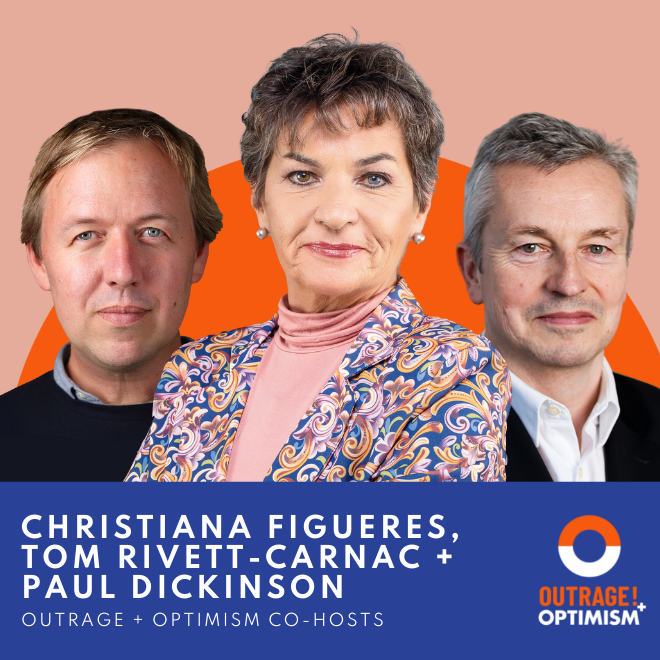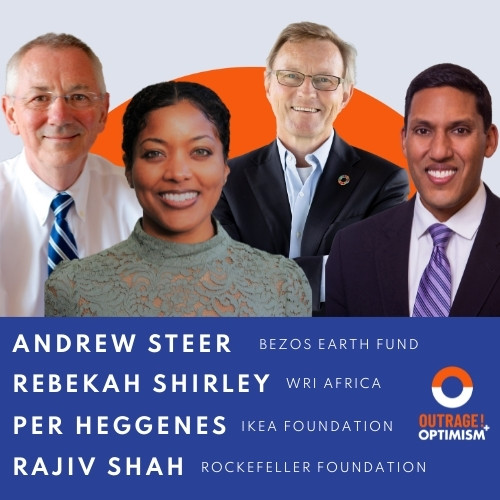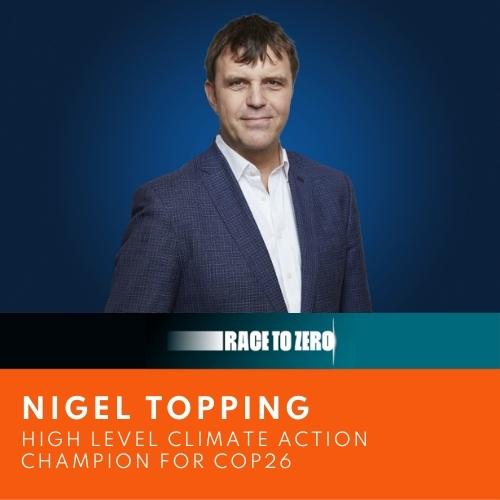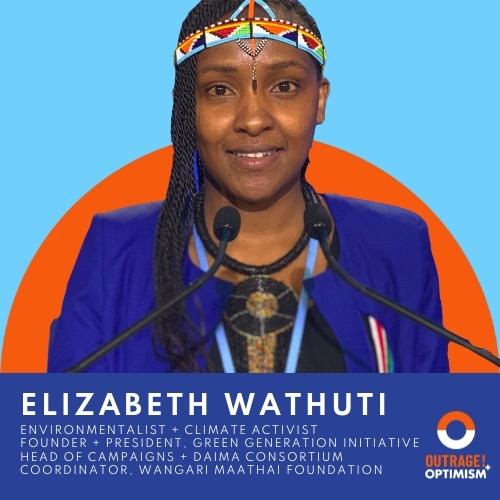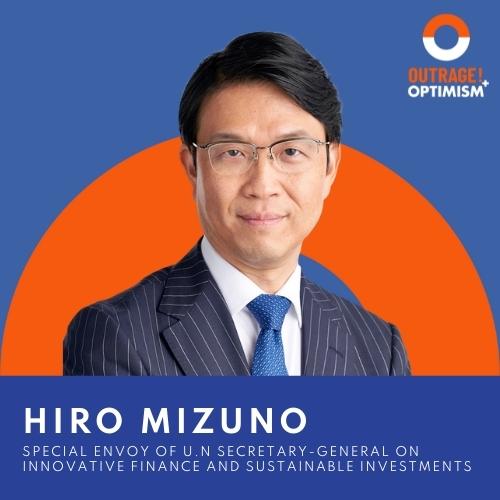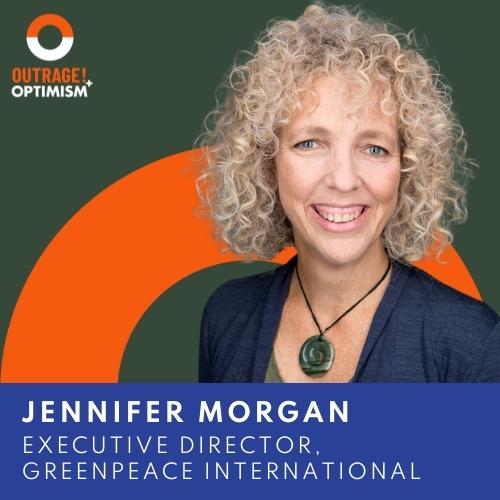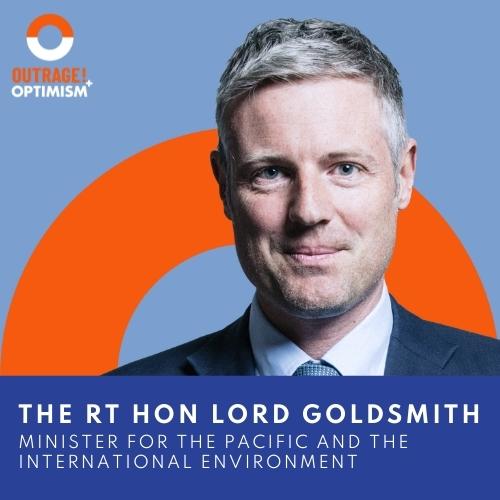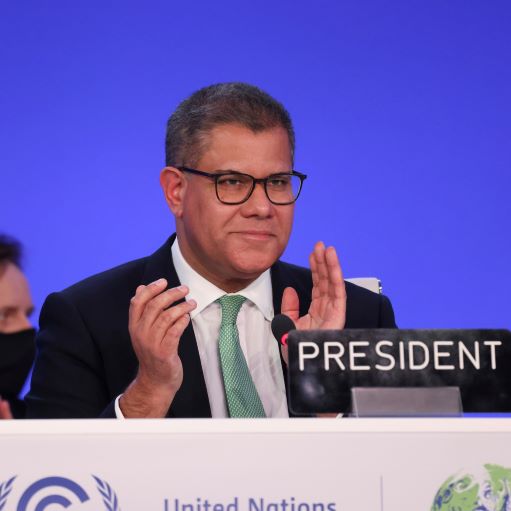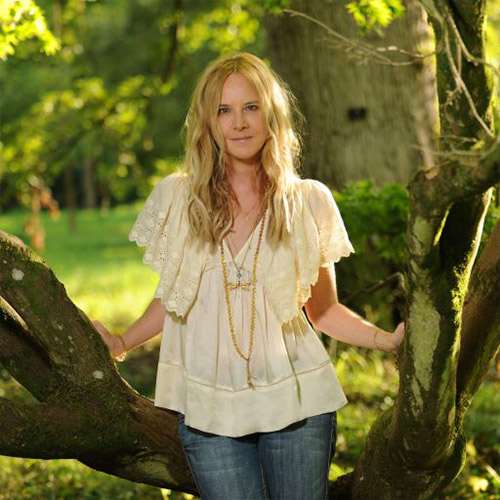132: Getting Over The Line at COP26 with Alok Sharma
Countries have stepped up. Projected emission trajectories have come down.
About this episode
Countries have stepped up. Projected emission trajectories have come down. But let’s be real for a moment: we are still not doing enough, fast enough. So what did this year's host of COP26 get right, and what's still in play as we prepare for COP27? Today we meet Alok Sharma, President of COP26.
As Alok takes us back through his experience at COP26 keeping 1.5°C front and centre, the grounding truth of how The Glasgow Pact directly impacts the lives and livelihoods of millions of people becomes crystal clear. In this episode we hear his perspective on how addressing the climate crisis must be both a personal experience and a global effort, and how trust was a precious commodity in the discussions – holding the key to getting an agreement over the line.
But how is this hard-earned political trust perceived outside the negotiation halls? It seems an increasingly challenging task to ensure that this is communicated in a digestible way to all the stakeholders working tirelessly for the phasing out of fossil fuels, climate justice, adaptation, and loss and damage.
Listen in to discover the Presidency’s plans to ensure that no small piece of the process allows it all to tumble down like a Jenga tower.
And stick around after the conversation for a cinematic musical experience with Sarah Class!
—
Mentioned links from the episode:
WATCH: ‘Resonate’ Official Music Video
DONATE: The World Land Trust
Watch
Full Transcript
Transcript generated by AI. While we aim for accuracy, errors may still occur. Please refer to the episode’s audio for the definitive version
Tom: [00:00:12] Hello and welcome to Outrage + Optimism, I'm Tom Rivett-Carnac.
Christiana: [00:00:15] I'm Christiana Figueres.
Paul: [00:00:16] And I am Paul Dickinson.
Tom: [00:00:18] This week, in the latest of our series of episodes on what happened at Cop 26, we bring you a special conversation with the Right Honourable Alok Sharma, MP, president of Cop 26. Plus we have music from Sarah Class. Thanks for being here. So we've been digging in and getting under the skin of what happened at Cop with a few breaks here and there, but this is the big one. This week we're bringing you a conversation with Alok Sharma, the man who in Paul Dickinson's world was sitting in the global electric chair for the two weeks during Cop 26, trying to steer the world towards the outcome that he ultimately was successful in doing. And as we've talked about before. It was a city of two tales, but there was a lot to be really optimistic and enthusiastic about in the outcome, and we will get into that. But first, I wonder, this is going to be a short introduction. Then we'll take more of the time that we have with you to do a bit of analysis after us when we talk about what Alok said. But Christiana, let's just start by making sure that people understand the role of the cop president. Could you just give us a brief pricey of what the cop president does?
Load MoreChristiana: [00:01:30] Yeah, I'll be happy to do that. But I have to warn you and everyone else that I have had to evacuate where I usually record and come out into the open in a public space. So I hate to tell those of you who are in the northern hemisphere winter, but we are starting our glorious dry season here and there are parakeets.
Tom: [00:01:51] Plus were on video zooms. We're suffering even more than your listeners.
Christiana: [00:01:57] You're bound to hear Parakeets and cries. So sorry about that. Right, the cop president. So the host country and as we know by now, the cops occur in different countries every year. And the host country, one of the responsibilities is to name a cop president. That is the political authority that presides over the meetings. But not only at the meeting itself, as we will hear from Alok, they actually also have the responsibility to prepare the political context in which the meeting will occur throughout the year. Now, Alok Sharma had actually thanks to COVID two years to do this, and I must say the UK really stood up to the challenge because they put together the largest cop presidency team I have ever seen. They were at it for two years, as opposed to one, not of their choice, but they definitely stuck with it and did an enormous amount of work despite COVID restrictions. Now, during the COP, the cop presidency and their team and the secretariat work hand in hand to ensure that all of the work needs to get done that is already ascribed to that. But also to get the political agreements that the COP presidency has previously announced. And we know that they had already chosen the topics which they wanted to deliver and they delivered on them. So kudos, I should say to the cop president himself, Alok Sharma, to the team and to the collaborative work with the Secretariat.
Tom: [00:03:55] Got it. So Alok played the role that, for example, Laurent Fabius played in Paris and Manuel Pulgar-Vidal. For people who remember back as far as Lima in 2014, a really critical role to bring the overall agreement together at the end.
Christiana: [00:04:08] And usually Tom, those cop presidents are ministers of foreign affairs or ministers of environment who have actually negotiated for their countries at previous cops. What Alok has reminded us in this interview that we will have is that he had never been to a cop. He had no idea. Other than what everyone shared with him, but he had never even been to a cop so even more brave to step into that very important role without even having participated in one before.
Tom: [00:04:46] And and a really interesting choice. I mean, one of my favorite podcasts is actually called political thinking from the BBC, and Nick Robinson interviews senior figures in the British political establishment. And there was a fascinating one some months ago with Alok Sharma known as No Drama Sharma. You know, he was somebody who was always cool. He's an accountant by background. He was very measured. And actually there was a moment at the close of Cop, which has become quite famous, where the emotions of steering the world through this difficult process really came to the fore. And we're going to play that little clip for you now.
Alok Sharma: [00:05:19] I just say to all delegates, I apologize for the way this process has unfolded, and I'm deeply sorry. I also understand the deep disappointment. But I think, as you have noted, it's also vital that we protect this package. Delegates, thank you. Thank you, friends. We need to proceed.
Christiana: [00:06:07] So that little clip that we've just played for you is a moment in which. At very much the end of the cop when most delegates had already stood up on stage and had their photo opportunity, and they were already celebrating two weeks of very hard work with good results. After all of that, China and then India were not in agreement with the wording that was in the text on coal, and they insisted on changing that wording to a version that was watered down to move from phasing out coal, to phasing down coal or phasing coal down. You know, from four for those who think coal is done anyway, it probably doesn't matter. And actually, it does not matter for the abominable economics of coal these days. But from a political point of view, there is a political message there. And the Indians were very, very clear that they would not accept the text if it said phase out, so they wanted phase down. Actually, it was China standing behind that, but they asked the Indian delegation to make the intervention. The reason why Alok is apologetic about this is because he had conducted two weeks of completely transparent negotiations in which there was no surprise, and this change caught some delegates by surprise. So it contradicted the spirit of the whole process that he had developed and conducted, and he apologizes for that one event. It does not apply to the entirety of the two weeks.
Tom: [00:08:11] Yeah, that's a good distinction.
Christiana: [00:08:13] And that is why he was so upset. Because it was very much the opposite of what he was committed to.
Tom: [00:08:19] Thanks, Christiana. So useful to have that contextualize in that way. And absolutely, it was related to a specific process that was ending at that moment. That's what he was talking about and the emotion that he brought to that moment, particularly when we understand who he was, and that's not necessarily his identity really just speaks to the stress of the two weeks. So we'll go to the interview in a minute. But just before we do Christiana, I just think it's so interesting the amount of pressure that is exerted on these very senior people in these moments. I just love to ask, you had quite a long engagement with Alok before the cop itself. What were your impressions of him as a cop president going in? And then we'll hear from him himself and we'll talk more going up.
Christiana: [00:09:00] Yes, I did. I was actually quite privileged, I should say, to have a long engagement with him. He actually came to Costa Rica quite a while ago when he had just taken on his responsibility and invited me to a very long dinner that we shared with the British ambassador here and some members of his team in which we talked about what a cop is, how to politically and strategically steer through it. But it was very much the early days. So very much of I would say, you know, for a president, I think an introductory conversation. What I was really impressed by is his willingness to listen, his humility because he is a very, very high standing political figure in the UK and his willingness to listen to everyone who came with suggestions, ideas, innovations. He was always very willing to listen, always taking notes, always asking very incisive questions, and you could see he was populating his own cognitive map with what he would eventually develop. So I was very impressed and I must say I heard, and I think I say that in the interview, I heard from many government representatives how they were very impressed by his deep commitment to listening, to transparency, to collaboration. No arrogance there whatsoever. Very, very willing to work as a learning team with very good results.
Paul: [00:10:57] Yeah, amazing bit of learning there. You know, we always thinking about selling and sort of, you know, speaking our minds and getting, you know, pitching, pitching, you know, and he's a great example of the most powerful kind of tool for selling is your ears to listen and to really understand where everyone else is, and that's kind of a way of coming into some kind of leadership.
Tom: [00:11:20] Great. Ok, so let's go to the conversation now and we'll be back after with a longer chat. Here is Alok Sharma, president of COP26.
Christiana: [00:11:34] Alok Sharma, president of COP26. Thank you so much for joining us once again on Outrage + Optimism. You were just remarking that the last time you were here, it seemed like 10,000 years ago. Here we are post-COP. We have had quite a few discussions on this podcast and as you can imagine, with different views of everything that was achieved, everything that is still on the table to be worked on. So very varied opinions, both from us actually and from other people. But you know what, I would love to know from you, is this having been your first cop presidency? I am not sure if there's going to be,
Alok Sharma: [00:12:22] My first cop.
Christiana: [00:12:23] Your first cop, that's right. I forgot about that important detail. What, despite all of the two year detail preparation, consulting with umpteen different people, having the largest team that there ever was and a cop residency, et cetera, et cetera, et cetera. So, you know, from some perspective, you could think actually everything was planned, everything was predictable. But I am sure that there were some things that no one warned you about because they were completely unpredictable. So what surprised you the most?
Alok Sharma: [00:13:01] Well, I mean, that's a very good question. I mean, what I would say, Christiana, is that in a way, you know, this was my first cop. And so I didn't have a reference point. You know, obviously people spoke about, you know, it always gets a bit tricky at the end and it did get a little bit tricky at the end. But we were so into the process over two years that actually you're constantly just focused on the goal of trying to make progress on, on mitigation on, on finance and adaptation. And that's what we did. And I had to say that I do think what we got over the line was actually a historic deal. I genuinely say that. I'm not a showy person, but I do think when you look back over time, this will be a deal that people will say, you know, these guys set out to keep 1.5 within reach and they did that. But of course, the key issue now is all of these commitments need to be turned into action, and that's what the presidency is about.
Christiana: [00:13:55] Well, and you know, to that, I would add that I have seen one or two cop presidents in my life and worked with many directly, and I must tell you that there was such a prevailing sentiment about you as a person, but also the way that you conducted the business of the cop. There was a prevailing sentiment of you very, very honestly and earnestly listening, truly listening to the variety, huge, huge variety of different opinions, different needs, different interests and being very transparent about the process. And that, I think, won not just trust in you, but actually Alok the most difficult value or the most difficult asset to achieve. And not just that, a single cop, but in the process, which is the trust of the parties in the process. It's always for me, it's always the most important component and it's also the most elusive. And for me, you know, always the knot in my stomach is, it takes so much effort and so much attention to detail and such a concerted effort to build the trust. And yet it can be lost in a second. And I just wanted to hear from you. How was that experience for you? Because you received at least, shared with me, and I'm sure there are others who shared differently, but not with me, but shared with me so many brownie points for the trust that you engendered into the process. How was that piece for you?
Alok Sharma: [00:15:46] Well, I mean, you know, firstly, I want to thank you because right from the start of when I took on this role, you and I spoke, you always gave me some really frank advice and actually very, very good advice. And some of the advice you gave me in the last few weeks really came into its own, and that's a private conversation that we can have. But what I would say is that one of the things that you emphasize and others emphasize was that you got to build the trust and people made the point that, you know, this is a really precious commodity in these discussions, and if you do not have the trust, you are not going to be able to hold all the parties together and get this over the line. And that's why from a UK presidency point of view, we put in so much effort as you're not just me, I mean, yes, I travel around. I think I went to 35 countries in eight or nine months, some of them twice to build that personal rapport with ministers. But you know, our negotiating teams, I mean, you know, they worked literally night and day because a lot of this stuff was done virtually. They literally worked night and day to build that trust. And I think for me in those final few critical hours, if we hadn't build that trust and we hadn't had those physical meetings in London, the pre-cop in Milan, and then had a whole range of ministers who worked with us to facilitate this process, I think it would have been really very tricky. And I do think it's because collectively that trust was built and the parties sort of also trusted each other, right? When ministers went to other ministers and said, you know, really, you may not be 100 percent happy with everything, but this is something historic. We need to work to get this over the line. That's what did it. So that was the best advice I think you gave me, and the best advice I received was build a trust, and that's what we did.
Christiana: [00:17:38] Well, if I can just take that one step further because as you say, it is the most precious commodity, and I think you and I would share the pain that the trust that was built inside, let's call it inside, the formal process is not a trust that is reflected outside. And it seems to me that now as we go into post-COP26 work and preparations for COP27, that continues to be the huge challenge because you were able to get a very important decision to bring governments together again next year, in a one year cycle. So ratcheting up the ratchet mechanism from five years to one, which is absolutely brilliant. But that is going to have to be done with a huge amount of credibility in order to build the trust of those who are not inside the official negotiating rooms and who will look at this process and look not just at COP26. They look at the whole process and they go, wait a second. That's the twenty sixth year that we've been hearing from governments. And have they actually really reversed the trend of greenhouse gas emissions? So that, I would say, is the next mountain to climb here, the next circumference, if you will, because we start with trust in the small circle and then those circles get larger and larger. How to build that trust over the next year, hand in hand, of course, with your Egyptian colleagues, how to build that in preparation for COP27. What are your thoughts on that even greater challenge?
Alok Sharma: [00:19:23] Yeah. So I think this issue of this being an inclusive process was again very, very important to us. And we understood this from talking to you and other folks who had held the cop presidency in the past. And that's why even during the time that we had the cop presidency designate, if I can put it like that, we did reach out to civil society, we did have a civil society advisory group. I think I'm happy to be corrected if this is wrong. But I think for the first time in a formal process, we set up such a grouping and that we work with them and we will continue to work with them. We reached out to a whole range of civil society groups. We have a friends of cop group. You know, you and others are part of that, but representing a whole range of non-state actors. And I think as part of this cop process and during those final two weeks as well, we were able to engage people. We were able to talk to them about what was going on in the process and of course, ensuring that observers were part of it. Clearly, one of the things that we're going to have to do is to keep up that engagement during the coming year. And I think one of the things that we are thinking about is also, you know, how do you track all these commitments that have come now? There are various mechanisms already that exist, but for those where no mechanism currently exists, how do we track this so we can demonstrate to people that at the end of this process, it isn't just about making commitments, but also ensuring that the actions come through. And you make a really important point about working closely with our friends in Egypt. And I, of course, you know, very sensitive to the fact that they are now the cop presidency designate. We will work very closely with them over this coming year. They will have their own clear objectives from what they want to get out of Sharm El Sheikh, but some of that work is part of that process that we started at COP26 itself.
Tom: [00:21:25] Minister, thank you so much for going into that. This is so fascinating to have a chance to ask you questions just a couple of weeks after the cop. I would just like to delve into, you know, the objectives that you stated very clearly were to keep 1.5 alive. And honestly, Christiana and I have talked about this the way the Ratchet worked in Glasgow. If we thought that that was possible in Paris, we'd have been thrilled, right? The way that it was delivered, countries did step up, emissions trajectories came down. Of course, it's not yet one point five. I mean, whether it's two point four or some say one point eight, if you had the other pledges in this, these things will be argued over. And really, I would say your achievement in keeping 1.5 alive has at least two components. One is the new range of national commitments and pledges in Glasgow, and the next is, Christiana has said, is this one year ratchet through to Egypt next year. But if you do the maths, if we're going to get that number much lower, we're going to have to see pretty chunky step ups from big economies in the next 12 months. So lots of small countries, of course, should be included. But we're back to where we were a few months ago. It's about G20 step up. It is China now going to come through as they didn't before. What can the U.S. really do with that difficult legislative situation that they're in? So this is as much now about national policy and encouraging leaders to be bolder and to go further at home so they've got more to bring. I'd love to just hear you talk for a few minutes around what's the plan? How are we going to work with partners to try to move that forward in the next 12 months?
Alok Sharma: [00:22:48] Yeah. So, Tom, I think the first thing to say is that I think what we've seen a demonstration of in Glasgow is that the Paris Agreement is actually working. Yes, after six years, we've closed the Paris rulebook, which was vitally important. But in terms of mitigation, it is working. You know, are we sort of at one point five? No. But if you look before Paris, you know, some of the projections we're heading towards six degrees of global warming by the end of the century. Post Paris four and now, depending on which ranges you take, you know, below two. And that, I think, is really important. So it demonstrates that the Paris Agreement is working in terms of this coming year. Obviously, we've had, I think, around one hundred and fifty NDCs, which have been enhanced. Many of those, in fact, are more ambitious in terms of emission reductions. But we've also seen at this cop a number of the biggest economies come forward with revised 2030 projections. India, for instance, Brazil, obviously, they will need to formally submit those over the coming months. You've got Turkey, for instance. I hope Turkey will also come forward with a 2030 emission reduction target. And then I think what we are going to need to see is countries which have made these pledges, which are currently not included in their NDCs, seeing whether they will include those in their NDCs as well. And clearly for other countries, it's a question of ensuring that they may have NDCs which are aligned with the Paris temperature goal. But what we will need to see is a more detailed policy around that. So there will be a range of different approaches that we take with countries. But ultimately, I think the one thing that everyone understands is that this is about ensuring that we work constructively with countries. You know, we can't legally force countries to do something that they want to do. But I think what Glasgow showed is that there is a peer pressure and that countries do respond when the world comes together and ask them to respond.
Tom: [00:25:03] Hmm. And can I ask you just one specific follow up on that about China? I mean, I don't know if we were honestly quite disappointed. We thought China was going to come through with something additional in the lead up to or during Glasgow. And of course they didn't. They just restated where they were before. Interestingly, if you look at the few months prior to Glasgow, it was sort of littered with a range of geopolitical issues outside of climate, you know, submarines in the South Pacific and stuff like this, that may have had a contributing factor to them not wanting to come forward. I mean, who knows, but I'd love to just know your analysis there of China. Why didn't they come forward with something more ambitious? And do you think that they've got something which we can because honestly, we're not really going to bend the trajectory much lower without China bringing their peaking date forward? So what are you expecting now in the next 12 months from China?
Alok Sharma: [00:25:51] So I think one of the things that China has said is that they're going to peak before 2030, some of the analysis out there suggests that they may well peak in 2025. They've said that carbon neutrality before 2060, that may indeed be earlier. But the key issue here for me was the detailed policy that goes with it, and they've set some of that. Bounce in the the initial sort of feedback on one plus n, but we need to see more of that. And I mean, I think it's worth noting, you know, at the end there was this issue on coal, but it's worth pointing out that actually, even with the wording that we have, it was again historic. I mean, you know, never before, right? Never before, Christiana, have we managed to get coal in those kind of decisions. Fossil fuels. Fossil fuel subsidies, rather in those decisions. So we have made progress. One of the things we've discussed on this podcast in the past is that each cop builds on the next. So I mean, you know, you were never going to achieve absolutely everything at this cop. But what this allows is, you know, we had a high ambition outcome. I do believe that and what it allows is to build towards Sharm El Sheikh.
Paul: [00:27:11] So Minister, thank you for what you've done and I have a personal question that I'd like to ask in a moment, but just one question. You know, I'm certainly not the international expert that everyone else on this podcast is, but it seems that maybe when, would I be right in thinking that it's for some of us, it's time to pivot to national government action. And what I mean by that is that, you know, to reduce at seven percent a year, we're going to need a lot of taxation and regulation. I was inspired by these words from Winston Churchill in Parliament in 1939, who said, “How can we continue? Let me say it with particular frankness and sincerity with less than the full force of the nation incorporated in the governing instrument”. To what degree do you believe that it's now time for national governments to orchestrate the changes in our laws, essentially to deliver these outcomes?
Alok Sharma: [00:28:06] Well, Paul, I mean at the World Leaders Summit, I think actually the messages were really very, very clear. And by the way, I mean, it's worth pointing out that even a few weeks before cop, there were people who were suggesting that we should postpone this one more time because of COVID. Actually, we put in place very strong measures and we didn't have any issues with COVID. And not only that would be put on, you know, the biggest summit of this type the UK has ever done, 120 world leaders came together, thirty eight thousand participants, 194 countries represented. And what I think we heard from world leaders was very clearly this is the time to act. And that was something that I was able to say over the next sort of 10-12 days as part of the negotiations. Keep reminding people that their leaders had said we needed to take action right now. Of course, what we are going to have to do is to ensure for every country that these commitments do translate into action. I mean, from a UK perspective, we've got a net zero strategy which was set out. We've put into law net zero by 2050. We have in law our carbon budgets as well. And you know, you are seeing countries around the world put into legislation some of these goals as well, and I hope we will see much more of that.
Paul: [00:29:28] Mm-hmm. Now, well, earnestly to be hoped for and governments perhaps also spending resources telling the people how serious the problem is. My personal question, if I may.
Christiana: [00:29:41] Oh, do you remember? Do remember that everyone except myself on this conversation is a Brit, and I'm not sure how much openness there is toward that. But, you know, try it.
Tom: [00:29:54] It's a British Open question. It was a British Open question, OK to laugh at, but thank you for the reminder, Christiana. No, but I mean, amazing work that you and your team have done a whole year ahead, which will be amazing also, I hope and believe. But many of our listeners will be fascinated with your personal journey, and I just wanted to ask, you know, at the centre of, perhaps there's a bit of a vacuum in a world government, but there you have been at the center of it. That extraordinary experience. I just wanted to ask how it might have influenced you or changed you.
Alok Sharma: [00:30:30] Well, I think, Paul, it's been a process. And you know, I've always said I've been asked about this before. You know, I'm not an eco warrior. I'm, you know, a normal person. I happen to find myself in this position and I did the best I could. But of course, this influences you, and I think you, you know, get into the detail of this. And for me, actually really brought it home to me what it is that we are trying to achieve. Having visited so many of these countries which are on the frontline of climate change, and you know, I've said this before, you know, talking to people in Nepal who have been displaced from their homes because of a combination of drought and floodin. Going to Barbuda. And I was in Barbuda some months ago and standing on that island four years after Hurricane Irma came in. Yes, there was some rebuilding, but it still felt looking around like, you know, this thing had come in a few weeks ago and then talking to the people and their huge concern about what the future holds. And I, a few weeks ago, I spoke to a very senior women's groups in Madagascar who are facing what I think many people have described as the first climate induced drought in the world. Almost four years without rain. And I think that's what for me has galvanized me is, you know, meeting people and I wish, I wish that is something that we could get everyone who is sceptical about this to experience and you talk to people on the front line.
Christiana: [00:32:03] That reminds me of a friend of mine who always reminds us that climate change is deeply personal. And as we understand that right, if we only talk about megatons and degrees and policies and ratchet mechanisms and keep it all there in our head, there is something that we can do. But honestly, as we make it more personal and we really understand how this is affecting the current lives of people around the planet, to not even mention future, it really does make a difference. And I'm actually going to say delighted, but delighted is not the right word. I'm touched that you have made that connection, Alok. A very important connection that I would agree that changes the way we work, changes the way we look at the work, so I am very touched by that.
Alok Sharma: [00:33:04] No, I was just going to say that. I mean, you talk about future generations. So actually, as part of this process, obviously, I have two two daughters. Obviously, those daughters didn't appear during this process, just to be clear. They are twenty two and twenty. But when I, you know, I've had a whole bunch of roles in government. The only one they have ever sort of responded to when I got the job was this one and I got a text.
Christiana: [00:33:29] Oh how interesting.
Alok Sharma: [00:33:31] I got a text and then on the on the Sunday after cop was over, I did a press conference with the prime minister in Downing Street and I got a lovely text from my younger daughter as well. And you know, so this thing that it is about the future generations, it clearly had an impact on them. And you know, I mean, if I'm being very frank, I was doing it partly for them as well.
Paul: [00:34:00] Yes, I saw the text is a beautiful text, actually. And just as a message to all of our listeners, it's the power of text messages to your parents. Never underestimate it. You've heard the minister speak with some passion on that subject.
Alok Sharma: [00:34:11] Yeah, I mean, positive messages to your parents, please.
Christiana: [00:34:16] Well, how wonderful for you to share that. I don't know how many people on this podcast, but also outside have told us that they have been hugely influenced by messages from their children. And I would say twenty and twenty two no longer qualifies them for children. But since mine are over 30 and I still think of my two daughters as children, once once a mother, always a mother, once a father, always a father. But Alok, that would bring us to our concluding question. And maybe, you know, the jump there is quite quite an organic jump because we would love to know now that that chapter is signed, sealed and delivered and we're opening the next chapter. What do you take home as your deepest outrage out of which passion to continue emerges? And what is your brightest guiding light of optimism?
Alok Sharma: [00:35:25] So let me take the optimism first. Would you say that I think that this court process has given hope in the process, and I think there were lots of people coming into this cop questioning what we might achieve. Questioning whether actually the multilateral process was worth proceeding with. I genuinely think there was a sense, a palpable sense that people were really concerned. And I do think we've got this historic Glasgow climate pact, and I do think it's given hope without a shadow of a doubt and actually just reflecting on those those last few hours when I genuinely thought for about an hour that we weren't going to get a deal over the line and someone was telling me that, you know this, this whole process is a bit like playing Jenga where, you know, if you want it, if you pull out one piece, the whole thing can collapse and it felt like that. And for months, people have been saying to me had been asking me, Actually, are you feeling the the,
Christiana: [00:36:27] The Jenga syndrome?
Alok Sharma: [00:36:29] Exactly. And it was there was an hour where I really felt like the world was on my shoulders. But I think that's optimism. But of course, we need to make sure that we deliver, get countries to deliver on their commitments. And I think from a sort of outrage point of view, I mean, it just came back to this issue that there are so many people, I mean, millions and millions and millions of people who are already facing a really, really difficult future. You know, lives and livelihoods on the line because the climate change that we've already got, the global warming we've already got. And you know, we talk about keeping 1.5 alive. I mean, you know, let's not kid ourselves. One point five is even at that temperature goal is going to be bad news for very many millions of people, right? So that's the bit that I think I have a sort of sense of outrage about. And that's what I think will propel the team, myself, all of us over this next year to make sure we do get countries to deliver on the commitments that they have made and that we do keep 1.5 alive going into Sharm el-Sheikh and beyond.
Christiana: [00:37:41] Well, thank you. I'm delighted to hear that Alok because I do think that all the very, very detailed work that you did in preparation for all of those commitments you and your team are the best positioned to ensure that those don't just remain as pieces of paper or words on a paper. President Alok Sharma of COP26, thank you so much for joining us on Outrage + Optimism. COP26 held us without breath like you, especially in those last few hours. But it is not the it is not the first or the last time that those very, very difficult hours are before the president and parties. And you did a brilliant job navigating that storm. So thank you very much for that.
Alok Sharma: [00:38:32] Thank you so much. Thank you, friends, and we will speak again, I'm sure in 2022.
Paul: [00:38:37] Looking forward to it. Thank you so much. Thank you. Bye bye.
Tom: [00:38:49] So how wonderful to get a chance to sit down with Alok just a couple of weeks after the cop to hear how it was for him and how he feels about the outcome. What did you both leave that discussion with?
Paul: [00:38:58] Well, I was really struck by his comments. You know, I kind of pitched him with my little kind of Churchill prompt that it was time for governments, national governments to take action now. And he kind of agreed actually. And I think this is really important for all of our listeners, he said. We've now got to go to our governments and say, right, the mandates are there, the commitments are there at the inter-governmental level. You need to now hold your national governments to account and you know, we're beginning to see that. I actually picked up on a speech from the chair of our Climate Change Committee in the UK talking about, you know, now the focus needs to be on strengthening delivery within the NDCs just for the UK, for example, and also inviting the Treasury to initiate a review of the role of tax policy on the road to net zero. And you know, I've said it before. I think this is absolutely key and actually, you know, linking it to a bit of news this week, people are starting to level these fees now. The Panama Canal Authority has put a greenhouse gas emissions fee on ships passing through the Panama Canal, depending on how fuel efficient they are. So I'm going to try and give regular updates on new laws in my rational revenue roundup, but I think that my point is that we're really seeing the link between the intergovernmental system. It's now up to us to push our governments to get the laws, to get us out of this mess, but well done and Alok for taking on that role, because I think it's, you know, it's a punishing thing.
Christiana: [00:40:22] Punishing thing. Hmm. I'm not sure that that sells the job for the next incoming president.
Paul: [00:40:28] And very rewarding. And you know, you got a fantastic tweet from your daughter, who also says in the same tweet, I'll see you in the library in two minutes. So there you go. I don't know if that means he's got a library in his house or they're in some big public building. But anyway, I digress.
Christiana: [00:40:45] I have a little suspicion that I would like to share. And that is I think Alok will be a very, very different sitting president to every other one that we have had in the past. We have a very strange process in the UNFCCC that it is the incoming president that prepares his or her cop. And once they get to that cop, then they become the sitting president for a year. So now after the cop, the incoming president will be the person designated by the Egyptian government to prepare COP27. And we will see all the political preparation of that. But Alok Sharma will be the sitting president. What usually has happened in the past is that sitting presidents basically go right. Thank God, that's done. I'm going back to whatever it was that I was doing before. To be the vice president of the country or the Minister of Foreign Affairs or the Minister of the Environment, or whatever it is that they have been doing. I don't think Alok is going to do that. A because, well, let's see what Boris Johnson decides to give him as any new role. But my sense is that Alok and his team, because he can't do it alone, and his team will actually continue in their responsibility to ensure that so many of the commitments that were made just a few weeks ago are actually going to come forward and will be able to be monitored and measured at COP27. That is an unusual follow up responsibility for the COP president. As I say, usually they wash their hands and they go goodbye. Don't invite me to be cop president ever again. I don't think Alok Sharma would like to be called president again, but we should have asked him that. But I do think that he is taking his follow through responsibility much more seriously than I have observed from any other past cop presidents. So we should I suggest we just sort of chalk that one up in, let's follow this throughout the year and come back to it at some point on the podcast to see Is he actually doing that or not?
Tom: [00:43:17] Well, you know, one comment I can make immediately on that, Christiana, because we stay in very close contact with many of the brilliant members of his team. And I know that the COP26 unit, far from being disbanded, is actually receiving more money and is now going to be expanded and there'll be more members of that team after the cop. I don’t know if that’s ever happened before.
Christiana: [00:43:34] And it already was the biggest team in history.
Tom: [00:43:37] It already was the biggest team. So that can only have happened because Alok was advocating for that effectively in whatever way resources are allocated inside the UK government. So I would share your suspicion that actually we're seeing that team now really beginning to ramp into gear. And I think the same is true by the way of Nigel Topping in the champions team. I think they'll be full throttle throughout the course of the next year or full electric pedal down.
Christiana: [00:44:01] Exactly electric pedal. So and you know, let's just remember that Alok does not come from the climate space. He does not even come from the environment space. You know, as you say, he is an accountant. But this has really got under his skin. I cannot imagine that he did the work that he did for two years with the sincerity, the humility and the dedication that he did without really this topic and this challenge getting under his skin. And we know those of us who are in climate that there is something that happens, right? There's a little bug that bites you and you become, I don't know how else to explain it, but climate addicted because you become, you know, so intent on contributing with everything that you can. And so I would like to welcome Alok Sharma to the expanding group of climate addicts.
Tom: [00:44:57] I think it's quite hard to go back to like selling widgets or something after you've been trying to save the world that you have nothing else.
Paul: [00:45:07] Meaning some kind of minister or something. Look, friends, we have a problem with global accounting for greenhouse gas emissions. I mean, I cannot think of anyone better qualified than an accountant to help us with accounting for global greenhouse gas emissions. His office has been expanded, Nigel Topping with the non-state actors office expanding. Things are really coming together. That's very exciting, isn't it?
Tom: [00:45:25] And actually, it's a good point because and we've talked about this on this podcast before, but one of the not necessarily weaknesses, but one of the challenges that remains to be addressed coming out of COP26 is this lack of confidence that commitments are going to be delivered, that people are serious about delivering what they say. So actually, Alok said in the interview that we just did that. That's the next task is; how do we track, how do we monitor, how do we demonstrate the real action is happening? That's the only way that we actually kind of heal that narrative. But I also think that I mean, I'd love to ask you, Christiana. There's really, I would say, two parts now to the task of continuing to double down of keeping 1.5 front and center in the next 12 months. One is to demonstrate that the commitments already on the table are made in good faith and will be delivered upon. And the second is to get more national governments to develop national policy and plan so that they can come forward so we can bend that curve even further down. I mean, Alok gave us sort of a slightly woolly answer about whether he was expecting more commitments from big countries in the next 12 months, and that's to be expected, right? We're only two weeks out from COP26. He's not really begun his engagements yet. Over the next 12 months, he's working out how he works with the Egyptians. But we have to see that, don't we? I mean, we have to see how we, we're not going to bend this curve unless we get significant countries in the G20 to increase their ambition in the course of the next 12 months. What's the road from here to there because it's looking quite difficult to me at the moment?
Christiana: [00:46:49] Well, one, I think, the evident first step is to get those governments to recognize all of the commitments that were made by private sector actors, by the finance sector, et cetera, et cetera, and policies and harvest those to understand what the implications are within their own national boundaries because those commitments were made basically without any consideration of national boundaries. And now that translation needs to be made so that they would be able actually, even if the only thing that they do is understand the national implications of all the commitments that were made across the board throughout this year, they would be able to increase their NDCs. Now they should be able to go beyond that because they should understand that their policies will be able to affect further decarbonization and increase adaptation. But at minimum, they should be able to harvest everything that is already on the table.
Paul: [00:47:55] Yeah and this relationship now between the intergovernmental process, which, by the way, can seem very bureaucratic. I was watching parts of the cop and, you know, all these lines of desks and subsidiary bodies. But but taking those commitments that were worked through with love, I think that was the phrase that you were encouraged to follow Tom. But look, hearing Alok say, I think what Glasgow showed us, talking about the fact that the Paris works, this is what Glasgow showed us is there is peer pressure and that countries do respond when the world comes together and ask them to respond. So as you said, these global investors global, corporations with crazy amounts of capital to invest, and I guess they're going to start choosing now between those countries, you know, where they invest, those countries that have got, you know, policies that sort of look forward and which is basically a safe environment for investment and those countries that are not paying attention, you know, head in the sand or, you know, ignoring the facts and providing an unstable climate for investment. Because the governments haven't established that their kind of investment safe, forward looking, climate compliant countries. And I think that's the contest for capital now.
Tom: [00:49:14] Yeah, no. It's going to be so interesting in the next 12 months. I mean, I can definitely see how the road from here to Egypt, we've got there's a whole range of things that have to be followed through on the loss and damage door is being cracked open. We have to follow that through doubling adaptation finance that was committed to at COP26. That's going to be a major precursor to a good mood when we get to Egypt. Delivering on the 100 billion. I mean, these are all parts of making sure the Jenga tower that Alok Sharma talked about stays up. And beyond that, there's also the additional commitments that need to come, that need to be harvested from the private sector commitments and others, as well as demonstrating that the commitments that are already there are made in good faith. And you know, if those pieces, we can put our arms around all of that Alok and his team, the high level champions in partnership with the Egyptians, this could be a really exciting year. It's kind of like we've been told to run a marathon up to Glasgow. We got to the end and we've been told we need to run another one through to Sharm el-Sheikh. But you know, this is the decisive decade. That's what we've got to do. Okay, anything else? Sharm el-Sheikh is where the next cop is going to be in Egypt.
Paul: [00:50:06] Very good. And the cop afterwards is going to be in the United Arab Emirates. Is that also confirmed?
Christiana: [00:50:08] Yes, that's confirmed.
Paul: [00:50:10] Very interesting. I'm trying to think about how,
Christiana: [00:50:12] Highly likely Abu Dhabi.
Paul: [00:50:14] Highly likely Abu Dhabi. Well, yeah, lots of messages. But I'm going to just pick up on one last one from the chair of our, sorry, the chief executive of our environment agency, which is kind of looking after the government department looking after the environment in the UK. Warning banks and financial institutions to get out of carbon fast and divest yourselves of what will soon be stranded assets and then in a call to action using a lovely phrase, I've not heard before, although we all know derivatives of it. Saying none of us is as good as all of us. And I think that's a great theme for us as we move forward together.
Tom: [00:50:52] Very nice. Great. So now as ever, we're going to leave you with some music this week. You have a beautiful piece for you from Sarah class. I hope you enjoy. Thank you for joining us this week. We'll see you early next week. Bye bye.
Sarah Class: [00:51:03] Hello, there, my name is Sarah Class, and this piece of music is called Resonate. I've written it to highlight an incredibly special campaign for the charity World Land Trust. It's the new soundtrack for their Guatemala appeal to save and protect a unique chain of ecosystems in Caribbean Guatemala called Laguna Grande. It's a beautiful tropical landscape of rivers and lagoons, seagrass meadows and tropical forests, all of which support hundreds of species, whilst also helping to mitigate the effects of climate change. I really hope you enjoy the music.
Resonate by Sarah Class [00:51:40] [Song plays]
Clay: [00:56:14] So there you go. Another episode of Outrage + Optimism. That was Resonate, composed and performed by Sarah Class with help from Caroline Dale Orchestra for the Earth and conducted by John Warner. Please go check out the performance for the song that was taped live and actually made into a cool, short film on YouTube, with nature and shots in the studio kind of mixed together. And I know you're listening to a podcast, so you like audio, but the visuals on this are really spectacular, so please go check it out and share with friends. Thank you to Sarah Class. Links to that and more of her music in the show notes. Thank you to our guest this week. Alok Sharma. These post COP26 conversations have been fascinating, and we have more of them coming your way soon as we wrap up the end of the year. So stay tuned. Actually, let me just give you the whole schedule here. So early next week, we've got a bonus episode with special envoy of the U.N. Secretary General on innovative finance and sustainable investments, Hiro Mizuno. It's a good one. Next week's Thursday episode is with the Executive Director of Greenpeace, Jennifer Morgan. She's an incredible person. You don't want to miss that. The following week we have on Zac Goldsmith, the UK minister who is responsible for pulling together the big nature package at COP26. The big outcome being ending and reversing deforestation by 2030, which, you know it's a big deal. And then for our final episode of the year, a holiday episode of sorts, you know, still kind of in the works we're figuring out as we go. So the best way to not miss any of these conversations is to hit subscribe and then tell a friend to hit subscribe so that in case you miss it, your friend will say, Hey, did you hear that Outrage + Optimism episode? And that's, you know, a real life notification. So, yeah, lots to come. And let me leave you with this. Our very good friend of the podcast, Sister True Dedication, had her incredible TED talk come out on Monday, and Tom said it's one of the best TED talks he's ever seen, and I completely agree it's the best. She starts her TED talk by suggesting we already have more than enough facts, information and technology to change the direction of our civilization and create a better world at a conference that features facts, information and technology that's supposed to change the direction of our civilization and create a better world. So what does she think we're missing? You'll have to watch. I have a link in the show notes to check that out. Sister, if you're listening, it's amazing. Thank you and congratulations. Ok, I got to go. My son is turning two on Saturday, so I got to go make food for the party. Hit Subscribe. We'll see you early next week. Bye.
Your hosts

Christiana Figueres
 Follow Christiana Figueres on Instagram
Follow Christiana Figueres on Instagram

Tom Rivett-Carnac
 Follow Tom Rivett-Carnac on Instagram
Follow Tom Rivett-Carnac on Instagram


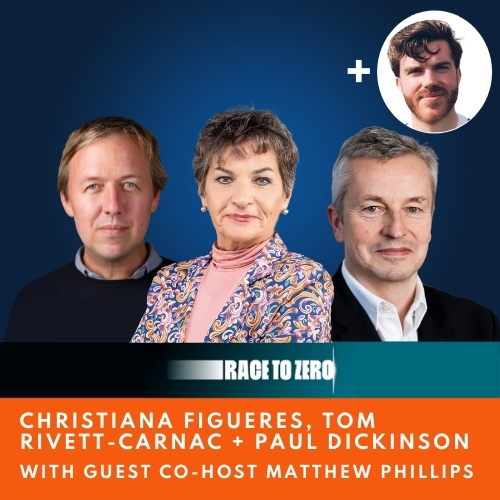
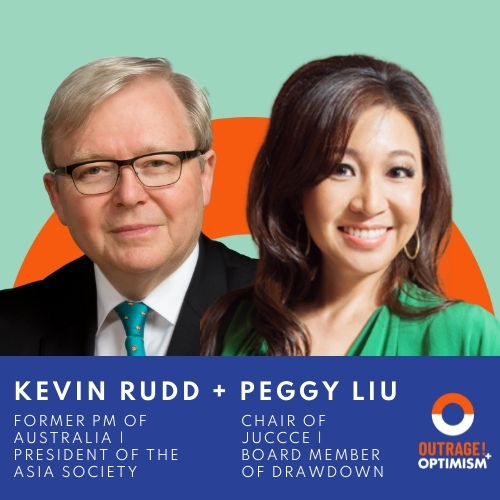
.jpg)
